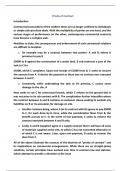Privity of Contract
Introduction
Commercial transactions of the modern times are no longer confined to individuals
or simple sale-purchase deals. With the multiplicity of parties on one hand, and the
various stages of performance on the other, contemporary commercial contracts
have become a complex web.
Needless to state, the consequences and enforcement of such contractual relations
are difficult to decipher.
1. An example may be a contract between two parties- A and B, where A
promises to pay B
£5000 to B against the construction of a water tank. B sub-contracts a part of the
task to C for
£1000, which C completes. Upon non-receipt of £1000 from B, C seeks to recover
the amount from A. A denies the payment as there was no contract ever executed
between A and C.
2. Conversely, while undertaking the task at A’s premise, C causes some
damage to the site. A
then seeks to sue C for contractual breach, which C refutes on the ground that A
was not privy to its sub-contract with B. The complication further intensifies where
the contract between A and B contains an exclusion clause seeking to exclude any
liabilities on B or its associates for damage on site.
3. Another instance being, where A (in its contract with B) agrees to pay £5000
to C, for work done by B. Here, while the consideration flows from B, the
benefit accrues to C. In the event of non-payment, C seeks to enforce the
contract executed between A and B only.
4. Lastly, A and B (supplier) agree in a supply contract that C will bear all costs
of materials supplied at the site, to which C has not consented otherwise or
of which C is not aware. Later, upon non-payment, B seeks to recover the
dues from C.
All of the above illustrate the nuances of the doctrine of “privity of contract” and
its implications on commercial arrangements. While there are no straight-jacket
solutions, certain principles have evolved over time in common law and statutes,
which attempt to provide a direction to the issue
, General Rule The Doctrine
The general rule at common law states that a contract creates rights and obligations
only as between the parties to such contract. As a corollary, a third party neither
acquires a right nor any liabilities under such contract. This is what the proclaimed
doctrine of “privity of contract” enunciates and establishes as the overarching rule
underlying any contractual relation.
The rule can trace its roots in the classical Roman law, which although later (in
seventeenth century) made a divergence to recognise third party rights of action or
contractual enforcement- Zimmerman, The Law of Obligations (Oxford University
Press 1996). Having followed this, English law too witnessed a journey of disarray -
while the rule of no third party rights or liabilities formed the foundation since as
early as the thirteenth century (Ibbetson, A Historical Introduction to the Law of
Obligations (Oxford University Press 1999)) evidenced in cases like Crow v Rogers
(1724) 1 Str 591, decisions favouring third party actions could be found in Dutton v
Poole (1678) 2 Lev 210, Pigott v Thompson (1802) 3 Bos & Pul 98,
and Carnegie v Waugh (1823) 1 LJ KB 89.
The position was somewhat fixed by the triple rulings in Price v Easton (1833) 4
B&Ad 433, followed by Tweddle v Atkinson (1861) 1 B&S 393, later affirmed in
Dunlop Pneumatic Tyre Co Ltd v Selfridge Ltd [1915] AC 847. In Price v Easton, the
contract between Easton and another party provided for certain payment to Price
against work done by such party. While the work was completed, Easton failed to
pay Price, who then sought to enforce the contract. The court ruled that, as Price
was not an executing party to the contract and did not supply any consideration to
Easton, no rights of enforcement arose in favour of Price.
In Tweddle v Atkinson concerning an agreement between Guy and John to pay
certain sums to William Tweddle where the contract allowed the latter to sue either
of them upon non- payment, the court disallowed such right of action as William
Tweddle was not a party to the contract. This result was corroborated in Gandy v
Gandy (1884) 30 ChD 57, and later in Dunlop Pneumatic Tyre Co, where a
manufacturer sought to sue a subsequent dealer for sale of tyres on terms in breach
of the original contract between the manufacturer and the intermediary
wholesaler. The court held that only a person who is a party to the contract can sue
on it or be sued, and thus, no right accrued to the manufacturer to sue the dealer




